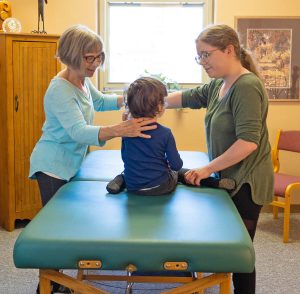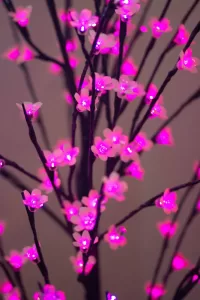- WE MOVED !!!
-
 Professional Acupuncture & Physical Therapy1118 East Superior Street
Professional Acupuncture & Physical Therapy1118 East Superior Street
Duluth, MN 55802(218) 724-3400 Clinic Hours
Mon8:00 am - 4:30 pmTue1:45 pm - 4:30 pmWed8:00 am - 4:30 pmThu8:00 am - 4:30 pmFriCLOSED

- Long Covid Booklet
Traditional Chinese Medicine
Winter Acupuncture GV14

Governing Vessel 14 is called The Great Hammer. This point is located below C 7 on the spine. C 7, the seventh cervical vertebrae is the one which is the most prominent. Traditionally the vertebrae were referred to as hammers because of their resemblance to the tool. This point is great because it is the intersecting point for all of the Yang meridians in the body. In winter time, this point is often used to treat colds and other illnesses that are common this time of year.
In Traditional Chinese Medicine there are six types of evils that can afflict the body. Wind, cold, heat, dryness, dampness, summer heat are the six evils, or excesses. Governing Vessel 14 is good at expelling pathogens in the body, including invasions of wind and cold, as well as summer heat. Wind cold can enter the body through the area between Governing Vessel 14 and Bladder 12. This is why it is important to wear a scarf in the winter. You want to protect your body from an invasion of wind cold. If you do become afflicted you may get a cold, fever, flu and experience coughing. In the summer, excess heat can cause high fevers and GV 14 is effective in reducing them. GV 14 can also be needled to keep the wei qi (the protective qi, akin to the immune system) strong, thus protecting the body from external pathogens.
Due to its location on the neck, GV 14 can be used for neck pain or stiff neck, pain along the spine, headaches, toothache and sore throats. As you can see, Governing Vessel 14 is not only a great point in general, but a critical point during the winter months when cold and flu season are upon us and the threat of evil wind and cold is all around us.
Contact Heidi today to learn more! Call (218) 724-3400 to schedule an appoitnent in Duluth Minnesota.
Acunpuncture for Postpartum: Gentle Support For Every Stage

Rebuilding, Restoring & Reconnecting
Once the baby is here, the body begins a deep recovery process. In Traditional Chinese Medicine, the postpartum period is called “the Golden Month”—a sacred window of time to nourish the mother and rebuild energy.
Acupuncture during this phase helps support:
- Hormone regulation and emotional balance
- Breastfeeding and milk supply
- Sleep and energy restoration
- Uterine healing and recovery
- Postpartum anxiety or depression
- Pain from delivery, C-section, or body strain
Even one or two postpartum sessions can help you feel more like yourself again. Acupuncture Is More Than Just a Needle—It’s a Companion for the Journey
From early pregnancy nausea to postpartum healing, acupuncture meets you right where you are—with personalized, holistic care that supports you as a whole person, not just a symptom or stage.
Curious how acupuncture might support your pregnancy or postpartum recovery? Let’s chat. Call us at (218) 724-3400 and Heidi will walk you through what’s possible.
Acupuncture for Pregnancy & Labor: Gentle Support Through Every Stage
 Whether you’re expecting your first baby or your fourth – pregnancy is a powerful journey—and let’s be honest, it’s not always the easiest ride. From swollen ankles and back pain to labor jitters and postpartum recovery, your body goes through a lot.
Whether you’re expecting your first baby or your fourth – pregnancy is a powerful journey—and let’s be honest, it’s not always the easiest ride. From swollen ankles and back pain to labor jitters and postpartum recovery, your body goes through a lot.
Thankfully, acupuncture offers natural, gentle support through each phase of this incredible transition. And no—it’s not just about pain relief. It’s about balancing your entire system so you can feel more grounded, more connected, and more prepared for what’s next.
Before Birth:
Supporting Pregnancy, Labor Prep & Breech Babies – Acupuncture during pregnancy focuses on helping your body adapt to the changes it’s going through. It’s safe, effective, and can be tailored to your trimester.
Common areas of support include:
- Nausea & morning sickness
- Back, hip, or pelvic pain
- Digestive issues or heartburn
- Fatigue or poor sleep
- Anxiety, stress, and emotional overwhelm
As you approach your due date, we shift into what’s often called labor preparation acupuncture. Around 36–37 weeks, many acupuncturists recommend weekly treatments to help:
- Encourage optimal baby positioning
- Relax and soften the cervix
- Regulate hormones and reduce anxiety
- Support restful sleep before labor
- Gently encourage the body to move toward labor naturally
And if your baby is breech (feet or bottom down instead of head-down)? Acupuncture, combined with a gentle heat therapy technique called moxibustion, is often used between weeks 33–36 to encourage babies to turn.
Moxa is a warming herb that’s burned near specific acupuncture points—especially on the pinky toes!—to stimulate movement and energy in the uterus. Several studies have shown this technique can significantly improve the chances of a baby turning on their own—non-invasively and safely.
During Labor:
Acupressure & Calm in the Chaos – While acupuncture isn’t typically done during active labor (unless you’ve got a doula or midwife trained in it), acupressure can be a game-changer.
Your acupuncturist can teach you and your partner simple pressure points to use during labor that may:
- Help with pain management
- Encourage contractions
- Calm the nervous system
- Boost energy during long labor
- Support dilation and downward movement
These techniques are simple, safe, and give you an empowering tool during the birth process.
Curious how acupuncture might support your pregnancy or postpartum recovery? Let’s chat. Call us at (218) 724-3400 and we’ll walk you through what’s possible.
Acupuncture for Kids

Most kids, as well as a lot of adults, are afraid of needles. So the pairing of acupuncture and kids might not be an obvious one. However, more and more parents are seeking alternative methods of treatment for their children, because our conventional medical system is faltering a bit. Pharmaceuticals are proving to be more harmful than beneficial for many people, especially kids, whose brains and bodies aren’t yet fully developed.
Acupuncture is gaining popularity among pediatrics. There are licensed acupuncturists who specialize in treating children and they are in high demand. These pediatric acupuncturists are helping children where others can’t and for many, it is lifesaving.
 Pediatric acupuncture is commonly known as shonishin and it rarely uses needles. Instead, this form of acupuncture utilizes the practitioners’ hands and rounded tools to stimulate the acupoints of the child. The practitioner will gently and rhythmically rub, tap and press the skin to produce gentle stimulation sensations. Because children process things more quickly and with fewer blockages, the sessions can be shorter and may be needed less frequently.
Pediatric acupuncture is commonly known as shonishin and it rarely uses needles. Instead, this form of acupuncture utilizes the practitioners’ hands and rounded tools to stimulate the acupoints of the child. The practitioner will gently and rhythmically rub, tap and press the skin to produce gentle stimulation sensations. Because children process things more quickly and with fewer blockages, the sessions can be shorter and may be needed less frequently.
Parents are turning to acupuncture because it provides a safe resolution of illness, while also preventing future illnesses. Acupuncture and acupressure stimulate the body’s ability to restore and heal itself. Our bodies are fully capable of fighting off disease and healing injuries when the right tools are provided. Acupuncture is that right tool that not only stimulates the immune system, but also relaxes the nervous system and regulates the digestive and hormonal systems. All of these things need to be in balance for the body to heal.
Many times parents are told by doctors that what their child is experiencing is just “a phase” and he / she “will grow out of it.” In many ways, this is a way of ignoring the real issues at hand. Conventional medicine doesn’t work holistically, addressing the whole body, and parents are usually sent to a dozen different specialists who never really coordinate to find the best treatment for the child. This becomes frustrating and financially taxing for the parent, not to mention how the child feels. This is where acupuncture excels. A single acupuncture treatment can address pain, anxiety, insomnia and digestive issues all at the same time.
Not only is acupuncture more cost effective when it comes to treating children, but it also is a more logical approach. Why add in the stress of seeing multiple doctors when you can have everything addressed by just one? If your child is suffering from pain, asthma, ADHD or any other type of ailment, acupuncture might hold the answer. Ask Heidi today for more information. Call (218) 724-3400 today to schedule an appointment.
The Shen Mind Connection

Traditional Chinese Medicine looks at things differently and while it may be a little confusing, there is usually some common ground that can be found upon examination and explanation. One such area is the idea of the mind. The mind in Traditional Chinese Medicine is commonly referred to as the shen.
In Chinese medicine, the shen is interpreted as the spirit or consciousness. The shen lives in the heart organ system and it is considered to be one of the vital substances of the body. The shen is said to preside over the activities that take place in the spiritual and mental planes. So, for many TCM practitioners, shen is actually referring to the mind. And if we look at serious mental illnesses such as schizophrenia and bipolar disorders, the shen or mind is where the dysfunction actually appears.
Chinese medicine refers to this as being “misted” or “clouded”. However, it should be noted not all practitioners agree the mind and the consciousness are the same thing. This is because many of our mental processes are considered subconscious.
As stated, the theory is that the shen lives in the heart. So if a person has a disturbed shen, there may be anxiety, stress, difficulty breathing, heart palpitations and more. Many people with a disturbed shen experience insomnia. Chronic insomnia can then lead to actual mental illness. If we follow this logic, we can see how the shen (in Chinese medicine) and the mind (in Western psychology) are related and somewhat interchangeable.
 When we approach the shen from the standpoint of Western psychology, it is hard to deny there is a lot of shen disturbance in the modern world. This can be anything from anxiety, depression and addiction to the aforementioned serious mental illnesses like schizophrenia. A person with balanced shen will present as healthy, harmonious and level-headed. A person with disturbed shen will present with a lack of spirit or emotion, illogical reasoning and symptoms of mental illness.
When we approach the shen from the standpoint of Western psychology, it is hard to deny there is a lot of shen disturbance in the modern world. This can be anything from anxiety, depression and addiction to the aforementioned serious mental illnesses like schizophrenia. A person with balanced shen will present as healthy, harmonious and level-headed. A person with disturbed shen will present with a lack of spirit or emotion, illogical reasoning and symptoms of mental illness.
Ultimately, we want to have a balanced shen. This means we may have emotional responses to external stimuli or internally generated thoughts or feelings and we are capable of controlling and recovering from these situations without much incident. Somebody who has a disturbed shen, would not know how or be able to deal with a similar situation and may act out irrationally
while drawing attention to themselves. An example would be when a person with a balanced shen becomes angry or cries for some reason. They tend to feel relief after the emotion has passed. While somebody with a disturbed shen may continue the irrational behavior for quite some time without ever feeling that relief and they might need intervention to return to a somewhat balanced state.
Maintaining a healthy shen also means that we maintain a healthy body. A strong shen is fundamental to good health. When the shen is weak, the body will eventually fail. To keep the shen healthy we should focus on maintaining a positive mindset, getting enough rest, seeking peace, connecting with nature, meditating and showing compassion. This means we ultimately need to avoid overwork, chronic stress, an erratic daily schedule, lack of sleep and volatile emotions such as anger, hatred and resentment. This may seem pretty logical, but based on the amount of shen disturbance/mental illness in the world, it is clear we have lost our way to some degree.
The good news is the cumulative shen of the planet can be changed over time and we can all have a hand in making that change.
